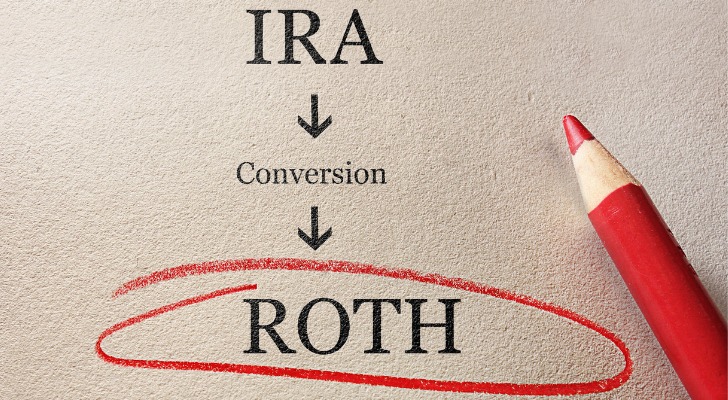I’m 60 and I would like to convert some money from my regular IRA to a Roth. I’m aware that the earnings are subject to penalty before five years but I won’t need that money until at least age 70. Is it advisable to do so? My annual income from a pension is $65,000 and I have $100,000 in my IRA.
– Thomas
Yes, a Roth conversion is worth considering and may very well be worth doing. I’ll go over some of the main points that you may want to consider as you think about whether or not you want to follow through with a conversion.
But before we jump in, a side note on your comment about waiting five years: there are three different Roth IRA five-year rules, and two of them frequently get mixed up and cause a lot of confusion.
Since you’re over 59 ½, you won’t be subject to the 10% early withdrawal penalty associated with distributions taken less than five years after a Roth conversion. However, if this is your first Roth IRA, then yes, you’ll need to wait five years to withdraw earnings tax-free. (And if you have similar questions about Roth conversions or other retirement planning topics, speak with a financial advisor.)
Why Do a Roth Conversion?

Saving money on taxes is the primary reason for doing a Roth conversion. In your situation, I think there are a couple of reasons that a Roth conversion could help with your tax liability.
Your Income and Tax Bracket
First, you’re in a fairly low tax bracket to begin with. If you have no income other than the pension you’ve mentioned, then it’s reasonable to think you are in the 22% marginal tax bracket if you’re single. Otherwise, you may be in the 12% tax bracket if you’re married and file a joint return with your spouse.
Because your income is from a pension, there’s also no reason to think your nominal income is going to fall in the future. This means that other than the slight annual adjustments to the tax brackets over time, you shouldn’t expect to fall into a lower bracket later.
However, keep in mind that provisions of the Tax Cuts and Jobs Act are due to sunset at the end of 2025. Unless Congress extends them or implements some other broad tax cut, income tax rates will go up and standard deductions back down.
It may make sense to go ahead and fill up your current bracket with Roth conversions gradually over a few years. Of course, also consider your state income taxes or if you plan to move to a state that doesn’t have income tax. (But if you need more help building a retirement income plan or optimizing your tax strategy in retirement, consider working with a financial advisor.)
Social Security Taxation
You’ll presumably also start receiving Social Security benefits at some point. I’m not sure what your plan is for that but those payments can start as early as 62 or as late as 70.
The amount of your Social Security benefit that is taxable depends in part on your other income. The formula is somewhat complex, but the general idea is that the higher your income, more of your Social Security benefit is subject to taxes. You may end up paying taxes on up to 85% of your Social Security.
Also keep in mind that taxable withdrawals from traditional IRAs are included in that formula. Qualified withdrawals from Roth IRAs are not.
Here’s where Roth conversions can really help. First, converting funds from your traditional IRA to a Roth IRA will increase your taxable income for the year but it won’t impact how much of your Social Security benefits are subject to taxes because you haven’t started collecting them yet.
Then, once you start receiving Social Security, the tax-free withdrawals from your Roth IRA won’t increase your taxable income, and in turn, how much of your benefits are taxable. (Speaking to a financial advisor if you need additional help planning for Social Security and retirement taxes.)
Greater Control and Flexibility

Another significant reason that some people find Roth conversions helpful is that they give you greater control over when to withdraw your money. You’ll be required to take minimum distributions (RMDs) from your traditional IRA, but not from a Roth IRA. This gives you more flexibility to plan your own distributions in regard to both timing and the amount you take.
For example, perhaps your $65,000 per year pension is all you need to live on. Having to take a full RMD from your traditional IRA will increase your tax liability for the year and potentially propel you into the next tax bracket up. By converting your entire IRA (or a portion of it) into a Roth IRA, you’ll either eliminate or reduce your eventual RMDs and maintain more control over your taxable income.
In this scenario, it may make sense to go ahead and do a series of gradual Roth conversions over the next few years. If you’re single, you can convert enough to bring your taxable income all the way up to $100,525 in 2024, meaning you’d “fill up” the 22% bracket. Likewise, if you’re married and file jointly, you can convert just enough to keep you taxable income under $94,300 and stay within the 12% tax bracket.
(And if you need help with this kind of planning, use this free tool to connect with fiduciary advisors.)
Bottom Line
If I were in your shoes, I’d give Roth conversions a deeper look. I think you may be in a good spot for them. You’re likely in a fairly low tax bracket based on your income and the current income tax environment. You may be able to save on taxes over time and gain more control over your distributions by doing several Roth conversions.
Tips for Finding a Financial Advisor
- Before settling on a financial advisor to hire, you’ll want to do your due diligence and speak with several potential candidates. Ask about their fee structures, services, typical clients and whether they earn commissions for making certain recommendations. For an in-depth look at how to find and choose a financial advisor, be sure to read this comprehensive.
- A financial advisor can help you with a Roth conversion and finding a financial advisor doesn’t have to be hard. SmartAsset’s free tool matches you with up to three vetted financial advisors who serve your area, and you can have a free introductory call with your advisor matches to decide which one you feel is right for you. If you’re ready to find an advisor who can help you achieve your financial goals, get started now.
Brandon Renfro, CFP®, is a SmartAsset financial planning columnist and answers reader questions on personal finance and tax topics. Got a question you’d like answered? Email AskAnAdvisor@smartasset.com and your question may be answered in a future column. Questions may be edited for clarity or length.
Please note that Brandon is not a participant on the SmartAsset AMP platform, and he has been compensated for this article. Questions may be edited for clarity or length.
Photo credit: ©iStock.com/zimmytws, ©iStock.com/Drazen_